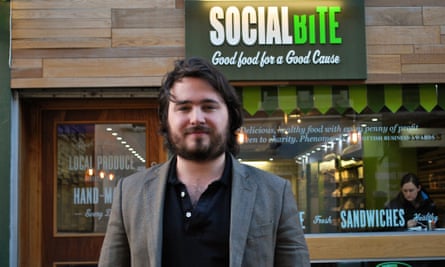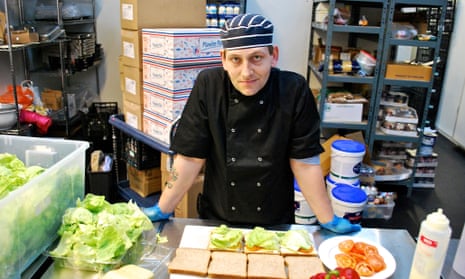Lunchtime in Edinburgh city centre, and Social Bite looks like any other busy high street sandwich bar. Wraps, rolls and soups and are eagerly devoured in neat wooden booths and window seats.
Yet this fledgling fast-food chain is doing something most companies would write off as too risky: employing homeless people with little or no history of work.
The not-for-profit business wants to take on Pret a Manger, Eat and Greggs, having opened four outlets in Scotland and formed plans to open another four across the UK in the near future.
However successful the business becomes, Social Bite’s owners insist at least 25% of their team will have struggled with homelessness. It means they depend upon members of staff who have spent time in prison or who have only recently overcome drug addiction.
Founders Josh Littlejohn, 28, and Alice Thompson, 24, were inspired by Nobel prize winner Muhammad Yunus after visiting his social businesses in Bangladesh in 2011.
Yunus pioneered micro-finance initiatives designed to help the poorest work their way out of poverty.
“We came back to Scotland keen to try something similar here,” says Littlejohn. “We thought we would set up a sandwich shop and donate the profits to good causes, but we knew we wanted to expand the social benefit to people around us who needed a break.
“And it happened quite naturally,” he adds. “There was a young homeless guy called Pete selling The Big Issue outside of our first shop, and we got chatting to him when he came in. He asked for a job, and we thought, ‘Well, yes, why not?’”

Pete quickly established himself in the kitchen. When the shop’s next couple of positions opened up, Pete was asked to recommend friends who also needed work, a process Josh calls peer-to-peer referral. “The people we have working for us now don’t want to refer anyone who would be a nightmare, so it’s people [who] they know are really ready to take a big step forward,” he explains.
Social Bite now has 14 ex-homeless recruits in cooking, catering and customer service roles. “You just have to use your instinct when you look in someone’s eyes and see the hunger there to turn things around,” explains Littlejohn. “There’s a bit of patience required – there have been a couple of small anger-management problems. But by and large it’s worked really well.”
Littlejohn, Thompson and their team have even managed to catch the attention of Hollywood superstar George Clooney. Impressed by the social benefits of the business venture, the actor has agreed to come and meet employees at the Edinburgh shop in November.
One member of the public will get the chance to attend a private dinner with Clooney in the Scottish capital by donating £5 in an online competition, with proceeds going to both Social Bite and Not On Our Watch (the humanitarian charity Clooney founded along with Matt Damon and Brad Pitt).
“We’re trying to be ambitious,” says Littlejohn. “We want to compete with Pret and Greggs. We’d like to give the big guys a run for their money. So you have to have the balance right between experience and allowing new people who haven’t had much employment to get up to speed. But the people who have been homeless bring that extra sense of determination. I think we’ve proved that if you give someone a chance, they can come good.”

John Brown works in Social Bite’s central kitchen in Livingston, preparing wraps and sandwiches for shops in Edinburgh and Glasgow. Two years ago he was homeless and had almost given up hope of ever finding full-time work. “I’d been through the lot – sleeping rough on the streets, sofa surfing, getting kicked out of places when I’d worn out my welcome,” says the 38-year-old.
“I was in the Social Bite shop in Edinburgh having some porridge one morning and I got talking to the owner, Alice. She asked me about my situation. And then she said, “Look, do you want to try a few shifts here in the kitchen?” And since then it’s worked out really well. I’ve got my own wee flat now in Edinburgh, and things are looking up. I can’t thank them enough for taking a chance on me.”
Social Bite is not alone in offering opportunities to the untested and overlooked. Connection Crew, a London-based event staging company, also has a one-in-four ex-homeless recruitment policy. The social business was set up as experiment by homelessness charity The Connection at St Martins-in-the-Fields in 2005, but required a re-launch in 2009 along more professional lines.
Unlike Social Bite, the rigging company requires potential recruits to be in stable accommodation and have gone through drug or alcohol rehabilitation if they have struggled with addiction, since the work demands are rigorous. “It’s an opportunity for people who are really ready to work,” says director Charlie Dorman. “To pull themselves out of a bad situation requires an incredible amount of motivation, and that energy and enthusiasm inspires a very positive working culture in the company.
“Some of our best workers have been ex-homeless,” adds Dorman. “It’s very satisfying to watch these guys get to the top of their game. At that point you forget about who has been homeless and who hasn’t, which is great. That’s the whole point of doing this.”
The international social enterprise hub is funded by the British Council. All content is editorially independent except for pieces labelled ‘brought to you by’. Find out more here.

Comments (…)
Sign in or create your Guardian account to join the discussion